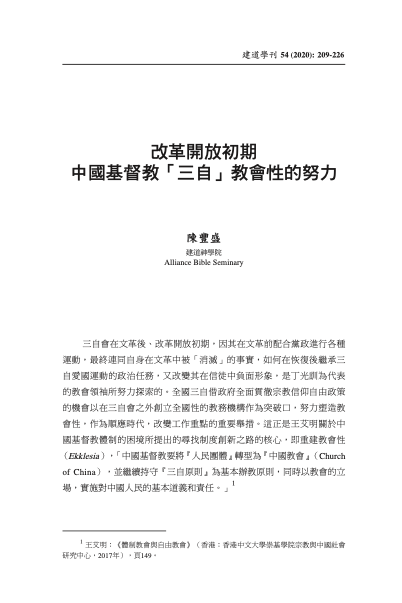改革開放初期中國基督教「三自」教會性的努力/陳豐盛
陳豐盛
撮要
「三自會」在文革後、改革開放初期,因其在文革前配合黨政進行各種運動,最終連同自身在文革中被「消滅」的事實,如何在恢復後繼承三自愛國運動的政治任務,又改變其在信徒中負面形象,是丁光訓為代表的教會領袖所努力探索的。全國「三自」借政府全面貫徹宗教信仰自由政策的機會以在「三自會」之外創立全國性的教務機構作為突破口,努力塑造教會性,作為順應時代,改變工作重點的重要舉措。本文追溯改革開放初期的宗教政策,研究全國「三自會」恢復之初的工作重點,分析浙江教會領袖蔡文浩的案例,探討「三自會」以「教會性」作為切入點,尋求其擴大團結面的目標。
ABSTRACT
Chinese Christian Three-Self Patriotic Movement Committee (“three selfs”, the same below) , cooperating with party and government administration, engaged in various kinds of campaign and finally were wiped out after the Cultural Revolution and during the first period of the reform and opening-up. Ding guang-xun, on behalf of the church leaders, worked so hard to explore the inheritance of the patriotic movement for three-self and tried to change its negative image among Christians. The three selfs started to set up nationwide educational institutions with the policy of religious freedom as the important measure of adapting to times and doing different work. This article traces back to the religion policy of the first period of the reform and opening-up to study the main work of the three selfs in the beginning of the recovery. It also tries to achieve the aim of expanding the unity by studying the cases of Cai wen-hao who was the church leader in Zhejiang province.
原載於《建道學刊》54期(2020年7月),頁 209-226。
最新文章
新手牧者研究計劃(三):新手牧者的身心靈狀態 / 盧慧儀
2025 年 11 月 19 日
個體與關係:滕近輝思想中「深化」的靈性觀 / 倪步曉
2025 年 11 月 18 日
香港九龍塘基督教中華宣道會之起源和發展史/陳智衡
2025 年 10 月 20 日
编辑精选
[電子書]困境與抉擇:「建道研究中心30週年誌慶」跨學科研討會論文集/廖炳堂、倪步曉主編
2025 年 1 月 2 日
從梧州到長洲:建道神學院125年的挑戰與恩典 / 陳智衡
2023 年 10 月 1 日
微小教會的見證/高銘謙
2023 年 6 月 1 日







